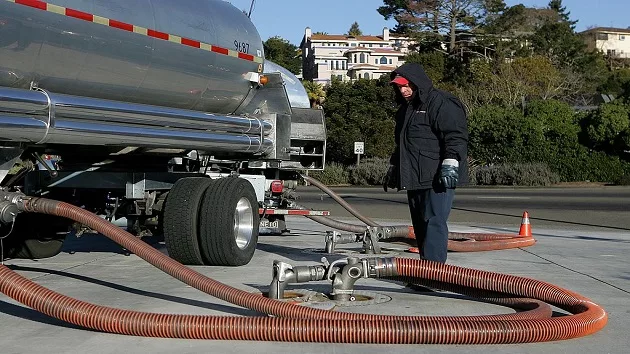(NEW YORK) — An escalation of conflicts in the Middle East in recent weeks has triggered a sharp increase in oil prices, raising uncertainty about where costs will head in the final weeks before Election Day.
Oil prices surged about 13% over an 11-day stretch ending on Monday. Prices fell markedly on Tuesday, however, as nearly a week passed without the onset of a widely anticipated Israeli counterattack on Iran.
The rise of oil prices carries potential implications for the presidential election next month. A hike in the cost of crude oil typically raises the price of gasoline, which holds substantial sway over general consumer attitudes, experts told ABC News.
For now, the recent increase in oil prices is not large enough to impact the election, experts said. However, they added, a further spike over the coming weeks could sour consumer sentiment and weaken approval of Vice President Kamala Harris, since her party occupies the White House.
“People use gasoline as a gauge of the economy and how they’re feeling about it,” Denton Cinquegrana, chief oil analyst at the Oil Price Information Service, told ABC News.
“A small change in prices probably won’t move the needle. If the price of a gallon goes up 50 cents, then that gets people’s attention,” Cinquegrana added, noting that such an increase is possible, but unlikely.
At least one expert cast doubt over the impact of even a sharp hike in oil and gas prices, saying it is unclear whether voters would fault Harris for the price spike and, even if they did, whether the few weeks remaining in the campaign affords enough time for higher prices to register with voters.
“People look at the economy over the long term, not the last month,” Jon Krosnick, a professor of political science at Stanford University who studies the relationship between gas prices and political perceptions, told ABC News.
In the aftermath of the Iranian attack on Israel last week, petroleum analysts told ABC News that the resulting spike in oil prices could push up gasoline prices between 10 and 15 cents per gallon. An increase of that magnitude would not affect the election, experts said, since the moderate uptick would do little to irk consumers and diminish their opinion about the nation’s economy.
“I do suspect that prices are going to continue to move higher, but I don’t think it will be significantly higher,” Cinquegrana said. “Unless something really goes haywire, I don’t expect prices to spike ahead of the election.”
A slight increase in gas prices may not matter much to consumers because costs at the pump have eased significantly over the past year, experts said.
Fuel prices have plummeted in recent months due to sluggish demand for gas as the busy summer traveling season has given way to an autumn slowdown. The average price of a gallon of gas is about 15% lower than where it stood a year ago, AAA data shows.
Despite its recent uptick, the price of oil has also fallen from a 2022 peak reached when the blazing-hot economic rebound from the pandemic collided with a supply shortage imposed by the Russia-Ukraine war.
A major escalation of the conflict between Israel and Iran, however, could send oil and gas prices much higher, analysts said, pointing to potentially dire consequences of an anticipated retaliatory strike by Israel against Iran.
While sanctions have constrained Iranian oil output in recent years, the nation asserts control over the passage of tankers through the Strait of Hormuz, a trading route that facilitates the transport of about 15% of global oil supply.
Intensification of the war could limit Iranian oil production or transport through the Strait of Hormuz, cutting global supply and sending prices upward, some experts said.
“The risk of a wider war in the Middle East has gone up,” Jim Burkhard, vice president and head of research for oil markets, energy and mobility at S&P Global, told ABC News. “There’s the risk of something happening that could lead to higher prices.”
A further surge in oil prices would send gas prices skyrocketing, which could damage Harris’ political fortunes if voters fault the Biden administration for the sudden increase in costs right before they cast their ballots, Carola Binder, an economics professor at the University of Texas at Austin who studies the relationship between gas prices and consumer attitudes, told ABC News.
“If there was a huge increase in gas prices, I could imagine that hurting Harris’ chances,” Binder said. “Consumer sentiment does affect elections.”
Such a forecast drew sharp disagreement from Krosnick, even though his research helped establish an understanding of the political implications of rising gas prices.
Krosnick co-authored a 2016 study in the academic journal Political Psychology that examined the relationship between gas prices and presidential approval rating between the mid-1970s and mid-2000s. The study found that elevated gas prices drove a president’s approval downward. To be exact, each 10-cent increase in the gas price was associated with more than half a percentage point decline in presidential approval, the research showed.
The findings do not shed light on a scenario in which gas prices spike ahead of next month’s election, Krosnick said, noting that his research examined shifts in public opinion over a much longer period of time. Plus, he added, voters may not fault Harris for the Middle East conflict that would drive the potential price increase.
“There isn’t enough time for there to be a sustained change in prices,” Krosnick said. “It takes a while to ripple out to consumers.”
Copyright © 2024, ABC Audio. All rights reserved.

